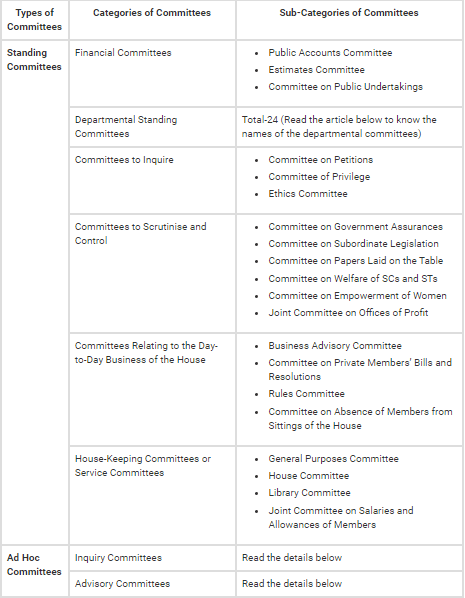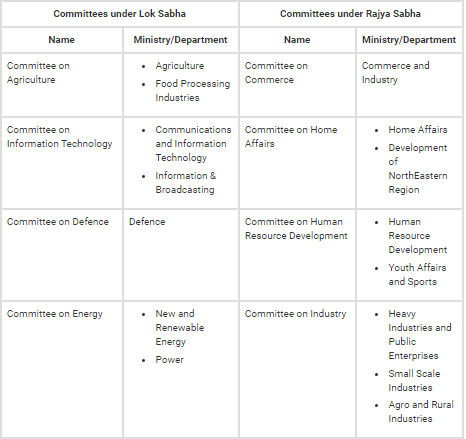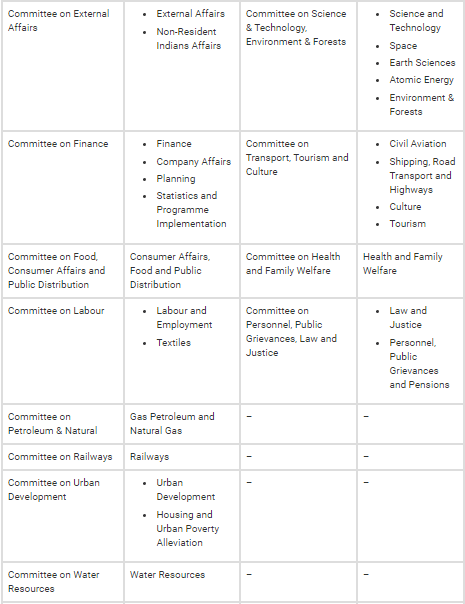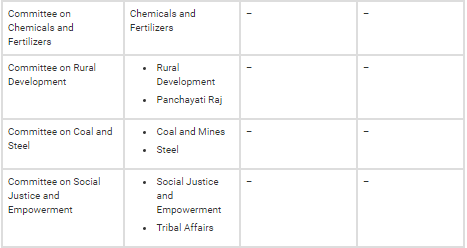Parliamentary Committees - Indian Polity Notes | Indian Polity for UPSC CSE PDF Download
How many types of Parliamentary Committees are there?
There are different types of parliamentary committees which are mentioned in the table below:
Parliamentary Committee in India
The table given above can be helpful for IAS aspirants to remember fo UPSC 2020 as chances are always there for questions coming in Prelims from this section.
Standing Committees
As given above that there are six types of standing committees in India. They are permanent in nature.
The details of all of these are given below:
1. Financial Committees
There are three categories of Financial Committees:
- Public Accounts Committee – It examins the annual reports of the Government and scrutinizes the reports of Comptroller and Auditor General laid in the parliament by the President. To read more on the Public Accounts Committee, check the linked article.
- Estimates Committee – It examines the estimates of the expenditure proposed by the government in the budget and suggests ‘economies’ in public expenditure. To read more on the Estimates Committee, check the linked article.
- Committee on Public Undertakings- It examines the reports and accounts of public undertakings. Read more on the Committee on Public Undertakings in the linked article.
2. Department Standing Committees
There are a total of 24 Departmental Standing Committees:- 8 under Rajya Sabha and 16 under Lok Sabha. The list of these committees is given in the table below:
Standing Committees – Departmental Committees


Functions of these 24 Departmental Standing Committees are:
- They work upon the demand for grants of the concerned ministries. They don’t propose any cut-motion
- They examine the bills of the concerned ministry
- They work upon the annual reports of the ministries
- They also consider policy documents presented the ministries before both the houses
Facts about Departmental Standing Committees:
- They don’t consider day-to-day administration
- They generally don’t intervene into matters taken up by another departmental standing committees
- Recommendations made them are advisory in nature, hence are not binding on the Parliament
3. Committees to Inquire
There are three types:
- Committee on Petitions – Whenever there is a petition on a bill or if there is any matter of general public importance, this committee examines those.
- Committee of Privileges – If any member of the house breaches the code of it, this committee acts upon it and proposes a suitable action. It is semi-judicial in nature. In Lok Sabha it has 15 members, in Rajya Sabha, it has 10.
- Ethics Committee – If any member of the house misconducts and shows indiscipline, this committee acts upon that and decides suitable action.
4. Committees to Scrutinize and Control
There are six types of these committees which are given below:
- Committee on Government Assurance – Whenever a minister makes any promise, or assure, or take any undertaking in Lok Sabha; this committee examines the extent of such promises, assurances and undertakings carried through by him/her. It has 15 members in Lok Sabha and 10 members in Rajya Sabha
- Committee on Subordinate Legislation – It examines whether the executives are exercising well, their powers to make regulations, rules, sub-rules and bye-laws delegated by the Parliament or conferred by the Constitution. In both the houses, it comprises 15 people
- Committee on Papers laid on the table – When ministers lay any paper on the table, this committee scrutinizes the credibility of the paper and if that paper complies with the provision of the constitution. It has 15 members in Lok Sabha and 10 in Rajya Sabha.
- Committee on Welfare of SCs & STs – It consists of 30 members. 20 are taken from Lok Sabha and 10 from Rajya Sabha. Reports of National Commission for SCs and National Commission for STs are considered by this committee
- Committee on Empowerment of women – The report of National Commission for women is considered by this committee.
- Joint Committee on Offices of Profit – This committee examines the composition and character of committees and other bodies appointed by the Central, state and union territory governments and recommends whether persons holding these offices should be disqualified from being elected as members of Parliament or not.
5. Committees relating to the day-to-day business of the house
There are four types of this committee mentioned below:
- Business Advisory Committee – It regulates the time-table of the house.
- Committee on Private Members’ Bills and Resolutions – It classifies bills and allocates time for the discussion on bills and resolutions introduced by private members
- Rules Committee – If there is any need of amendment in the rules of the house, this committee makes a proposal
- Committee on Absence of Members – All the leave applications, applied by the member of the houses are taken up by this committee
6. House-Keeping Committees
There are four types of this committee mentioned below:
- General Purposes Committee – Matters that do not fall under the jurisdiction of other parliamentary committees are taken up by this committee. The members of this committee comprise :
- Presiding officer (Speaker / Chairman) as its ex-officio chairman
- Deputy Speaker (Deputy Chairman in the case of Rajya Sabha)
- Members of the panel of chairpersons (panel of vice-chairpersons in the case of Rajya Sabha)
- Chairpersons of all the departmental standing committees of the House
- Leaders of recognised parties and groups in the House and,
- Other members as nominated by the presiding officer
- House Committee – The facilities given to the members of the houses in the name of residences, food, medical aid, etc are supervised by this committee
- Library Committee – The library of the houses and the amenities attached with it are managed by this committee
Ad-Hoc Committees
There are two types of ad-hoc committees. They are temporary in nature.
The details of these committees are given below:
1.Inquiry Committees
These committees can be proposed by either house or can also be appointed by the speaker/chairman of the respective house. Few examples of Inquire Committees are:
- Joint Committee on Bofors Contract
- Joint Committee on Fertilizer Pricing
- Joint Committee to Enquire into Irregularities in Securities and Banking Transactions
- Joint Committee on Stock Market Scam, etc.
2.Advisory Committees
These committees are select or joint committees appointed for the matters of bills. They report on particular bills. They are different from the inquiry committees as the procedure that they follow are laid down in the Rules of Procedure and also are directed by the Lok Sabha speaker or Rajya Sabha chairman.
|
154 videos|994 docs|260 tests
|
FAQs on Parliamentary Committees - Indian Polity Notes - Indian Polity for UPSC CSE
| 1. What are parliamentary committees in Indian polity? |  |
| 2. How are parliamentary committees formed in India? |  |
| 3. What is the role of parliamentary committees in Indian polity? |  |
| 4. How do parliamentary committees contribute to the legislative process in India? |  |
| 5. What are the different types of parliamentary committees in India? |  |
















